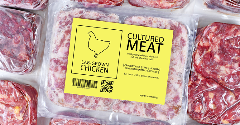News
Pandemic drives an increase in meat consumption across UK
2 Feb 2021After years of growth, the movement of consumers away from meat has slowed in the UK, according to new data from Mintel. Over the course of 2020, the percentage of Brits reducing their meat consumption dropped from 51% in 2019 to only 41% in 2020.
This decline in those eschewing meat from their diets coincided with a rise in processed meat sales, which spiked 18% to £3.7 million ($5 million) in 2020. Sales of bacon, sausage and burgers all rose with gains of 18%, 20% and 26% respectively. Deli meats, a category that has waned in recent years, posted a 22% increase in category sales in 2020.

Mintel found part of the reason behind these gains is due to the comfort associated with meat dishes. Over half (58%) of consumers eating meat and poultry said that meals with meat are comforting. This finding is reflected in data from the International Food Information Council (IFIC), showing that in 2020 19% of those surveyed had eating habits that had become less healthy over the course of the pandemic with consumers seeking out more comforting and indulgent foods.
While eating less meat is widely considered by consumers to contribute to greater overall health, many also consider it better for the environment, which has become an important consideration for shoppers. In its survey, Mintel recorded that between 2018 and 2020, the number of Brits that considered eating less meat to be better for the environment increased from 25% to 42%. Similarly, a study from the consulting firm Kearney similarly found that as of this spring, 83% of consumers considered the environment when making purchases, up from 71% in 2019.
Nevertheless, the uncertainty and disruption caused by COVID-19 has driven environmental and health considerations to take a back seat to other concerns such as value and availability. The IFIC found 28% of shoppers were worried about their ability to afford enough food in 2021.
Still, although the pandemic caused a seismic shift in consumption habits, Mintel expects this return to more meat consumption to be short lived. In the mid- to long-term, the market analysis company foresees a return to the general trend of eating less meat, and therefore offered a positive outlook for plant-based companies that are working to earn a bigger slice of the market even as they continue to compete on price and perceived benefits as compared to animal-based options.
Related news

‘Health’ labels on products reduce consumers’ willingness to pay
10 Mar 2025
A study into front-of-packaging “health” labelling finds that these labels alone can lower US consumers’ willingness to pay.
Read more
Smaller snack sizes represent big growth opportunity for PepsiCo
5 Mar 2025
Brands are responding to consumer demand for healthier products by developing classic snacks in smaller portion sizes, meaning fewer calories, lower sodium, and lower fat.
Read more
Is the price of a sustainable and healthy diet… unsustainable?
4 Mar 2025
Healthier foods are more than twice as expensive per calorie as less healthy foods, with healthier food increasing in price at twice the rate in the past two years.
Read more
F&B industry hit with fresh greenwashing claims
26 Feb 2025
The food and beverage (F&B) industry is under fresh scrutiny amid claims of greenwashing, with Arla the latest company in the firing line.
Read more
Mealworm protein faces commercial roadblocks as producers struggle
25 Feb 2025
The financial struggles of Ÿnsect, one of Europe’s largest insect protein producers, have raised concerns about the viability of large-scale mealworm farming.
Read more
Water lentils approved as a vegetable in the EU
24 Feb 2025
Water lentils have received approval from the European Food Safety Authority (EFSA) for production and consumption as fresh vegetable in the EU.
Read more
Cultivated seafood company roe-volutionising the caviar market
21 Feb 2025
A Singapore-based startup is targeting premium markets and younger consumers with its latest innovation – cultivated caviar.
Read more
Protein diversification: A massive missed market?
20 Feb 2025
Germany and the UK could be missing out on the massive market for alternative meats and proteins, with one new coalition calling for an end to the “steak-tofu struggle”.
Read more
Singapore explores farmland-free food production
17 Feb 2025
Researchers discover new technology replicating on-farm food production conditions from within the indoor lab environment.
Read more
Indians enjoy first bites of cultivated chicken
13 Feb 2025
The first public tasting of cultivated meat in India has taken place as the country prepares for the first commercial cultivated meat products – potentially as early as the end of this year.
Read more